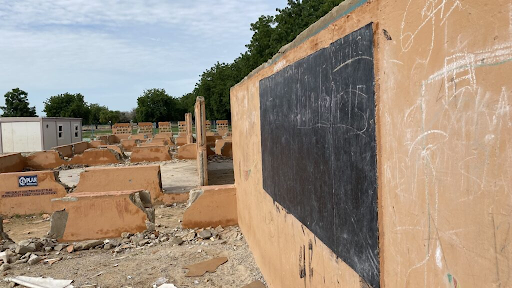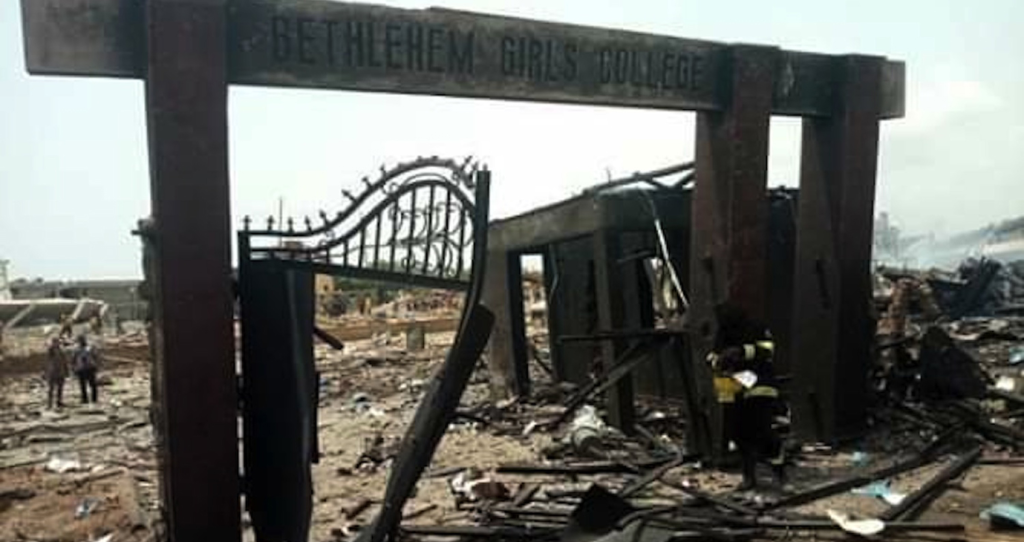The Devastating Impact of School Fire Disasters on Nigerian Education
Several tragic school fires have claimed the lives of students and staff, leaving deep scars on families. These fires have been caused by insurgent attacks, electrical faults, and a lack of emergency preparedness.

On the night of Feb. 4, a tragic fire outbreak occurred in an Islamic school in the Kaura-Namoda area of Zamfara state, North West Nigeria, resulting in the loss of at least 17 young Almajiri students. The incident also left 16 others critically injured. Eyewitness accounts revealed that the fire started in the study hall of Makaranta Mallam Ghali, a local Islamic school known for accommodating pariah pupils. When the fire broke out, about 100 students were inside the hall, reciting the Quran and preparing for their night’s rest.
However, investigations by local and state authorities suggest that the fire may have been ignited by a pile of dry wooden sticks, commonly known as kara, which students use for oral hygiene. Witnesses reported that the flames spread rapidly due to the highly flammable materials stored in the school.
Salah DanRabi, one of the parents of the pupils killed during the fire outbreak, said he was shocked when he saw the bodies of his children razed by the fire. “Five of my children were involved in the fire inferno. We confirmed that two died, 3 in severe injury with their skin burnt. The situation is worse. I can’t believe they could look this bad,” Salah cried.
Reacting to the ugly development, Zamfara State Governor Dauda Lawal described the fire incident as highly unfortunate. Sulaiman Idris, the governor’s spokesman, said, “Our condolences to the families, the school, and the entire nation as we mourn the loss of these young souls. During this time of sorrow, may the Almighty Allah provide strength and comfort to the grieving families as they navigate this difficult period. I extend my wishes for a speedy recovery for the injured.”
President Bola Ahmed Tinubu also conveyed his profound sympathies to the affected families and demanded prompt action to raise safety standards in schools across the country.
“This tragedy is a wake-up call. We must ensure that our schools, whether Islamic or secular, are equipped with fire safety measures to prevent such devastating losses,” said Bayo Onanuga, Tinubu’s adviser on Information & Strategy.
Not the first time
Over the past decades, Nigeria has witnessed devastating fires that have resulted in significant loss of lives and property. Some of these incidents have occurred in schools, raising serious concerns about safety measures. Given the recurring fires in many Nigerian schools, one is tempted to ask: Is the quest for knowledge becoming a death trap?
In past years, several tragic school fires have claimed the lives of students and staff, leaving deep scars on families. These fires have been caused by insurgent attacks, electrical faults, and a lack of emergency preparedness. Concerned Nigerians have warned that the lives of these children should be safeguarded diligently and must be protected at all costs by ensuring preventive measures are in place. They also advised that strong safety protocols build trust among parents and guardians.
“The children killed during the fire incidents could have been saved if the fire service was active,” said Sani Johnson, a resident of Zamfara, who spoke to HumAngle. “The children were helpless and couldn’t quench the fire quickly. They contacted the fire service, but they were not just responsive.”
Also, fire tragedies in schools have been deployed by terrorists to establish horror and fear in society. On July 6, 2013, a devastating fire broke out at Government Secondary School, Mamudo, in Yobe State, claiming the lives of 42 students and teachers and leaving behind a horrific scene of suffering.
The fire began in the early hours of the morning when armed Boko Haram militants stormed the school compound while students were still asleep. Carrying petrol bombs, explosives, and firearms, the attackers set classrooms and dormitories ablaze. The flames spread rapidly, trapping students inside as gunmen fired at those trying to escape. The attackers doused the buildings with gasoline and ignited them, ensuring the flames consumed entire structures within minutes.
By the time the gunmen left, the school was in ruins. Classrooms and dormitories had been reduced to ashes, and the air was thick with smoke, the stench of burning flesh, and the cries of the wounded. Some students were burned beyond recognition, while others succumbed to gunshot wounds after being chased from the burning structures.
On July 7, the then Yobe State Governor, Ibrahim Gaidam condemned the attackers and ordered all secondary schools in the state to close until September, the start of the new academic year. This incident left many parents mourning their children, and survivors, haunted by fear, lost interest in returning to school.
A similar incident happened in Lagos but in a different narrative.
In 2020, another tragic fire outbreak occurred in the Abule-Ado area near Festac Town, Amuwo Odofin Local Government Area, Lagos State. The explosion and subsequent fire were triggered when a truck crashed into gas cylinders stacked in a gas processing plant near a vandalised petroleum gas pipeline. The explosion, which occurred around 9 a.m. on Sunday, March 15, 2020, raged until 11 p.m. that day.
The disaster claimed 23 lives, injured 25 people, and destroyed 50 houses – including facilities at Bethlehem Girls College, Abule-Ado. While the students managed to escape, 60 were injured, and six non-academic staff members lost their lives. The school’s principal, Henrietta Alokha, died while heroically attempting to rescue her students from the fire.

“She was there evacuating the children to make sure that none was left, and at the final point of leaving the place, a brick fell and hit her,” said Tony Ogidi, the chairperson of the Parents-Teachers Association (PTA), referring to the deceased teacher.
Stakeholders in the school community pointed to the Lagos State Government’s Executive Order on Child Protection and Safeguarding Policy, issued on December 16, 2016, under the Child Rights Law of Lagos State (2007, as amended). This policy was designed to be implemented in all schools and child-related institutions across the state. However, four years after its promulgation, questions remain about how effectively it has been enforced.
Amid recurring fire incidents in Nigerian schools, some experts in fire management suggested that fire safety education be included in the school curriculum as part of a plan to prevent the frequent fire outbreaks witnessed in recent years.
The experts emphasised the urgent need for preventive measures and the adoption of some strategies to significantly reduce the risk of fire incidents and protect lives and property nationwide. A public health expert, Funmi Adeola, stressed that public awareness campaigns on fire safety had become imperative as a preventive measure on fire outbreaks and, as such, should be incorporated into the syllabuses.
“Nigerians need to understand the risks and know how to respond in case of an emergency. Regular fire drills and installation of smoke detectors are paramount for the entire family to prevent fire disasters. Also, training and having clear evacuation plans are essential steps everyone needs to learn that can save lives,” Adeola said.
Ibrahim Suleiman, a building engineer, called for stricter enforcement of building codes and the establishment of fire safety regulations in line with international standards to prevent fire outbreaks. “The government must take the lead in ensuring that buildings are constructed with fire-resistant materials and that there is adequate access to fire-fighting equipment in every community,” he said.
Additional reporting by Ibrahim Adeyemi.
A tragic fire at an Islamic school in Zamfara, Nigeria, killed at least 17 students and injured 16 others. The blaze likely started from flammable materials used by students.
The incident highlighted a lack of safety measures both in Islamic and secular schools in Nigeria, stirring reactions from state officials, including Zamfara’s State Governor Dauda Lawal and President Bola Ahmed Tinubu, who called for improved safety standards.
The fire at the school is part of a troubling pattern of devastating fires in Nigerian educational institutions, including a Boko Haram attack in Yobe State in 2013 and a gas explosion in Lagos in 2020.
These incidents underscore the need for urgent improvements in fire safety protocols, emergency preparedness, and implementation of existing child protection policies.
Experts urge the inclusion of fire safety education in school curriculums and stress the importance of fire drills, smoke detectors, and clear evacuation plans. Building engineer Ibrahim Suleiman calls for stricter enforcement of building codes and fire safety regulations, emphasizing the government’s role in prevention.
Support Our Journalism
There are millions of ordinary people affected by conflict in Africa whose stories are missing in the mainstream media. HumAngle is determined to tell those challenging and under-reported stories, hoping that the people impacted by these conflicts will find the safety and security they deserve.
To ensure that we continue to provide public service coverage, we have a small favour to ask you. We want you to be part of our journalistic endeavour by contributing a token to us.
Your donation will further promote a robust, free, and independent media.
Donate HereStay Closer To The Stories That Matter




